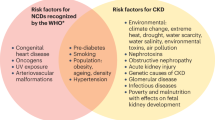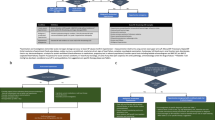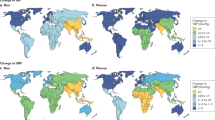Abstract
Nonadherence to antihypertensive drugs is a primary reason for suboptimal clinical outcomes among hypertensive patients. We assessed adherence to newly initiated antihypertensive medications in non-elderly Japanese patients and examined which patient and facility characteristics were associated with low adherence. We selected new oral antihypertensive drug users, aged 30–74 years, between 2014 and 2016 from a large administrative claims database. We measured adherence as the proportion of days covered (PDC) during a 1-year follow-up and divided patients into three groups of low (PDC < 40%), intermediate (PDC ≥ 40% to <80%), and high (PDC ≥ 80%) adherence. Factors associated with low adherence were assessed by logistic regression analysis with generalized estimating equations. Among 31,592 patients (mean age, 51.7 years; 41.2% female), the median 1-year PDC was 88.5% (IQR: 41.9–98.1%). In total, 59.2%, 16.6%, and 24.2% of patients were categorized as having high, intermediate, and low adherence, respectively. Female sex (odds ratio [OR] 1.15, 95% confidential interval [95% CI] 1.08–1.22), younger age, and the initiation of angiotensin-converting enzyme inhibitors (OR 1.37, 95% CI 1.12–1.66), beta-blockers and thiazide diuretics (OR 4.82, 95% CI 4.34–5.36 and OR 3.91, 95% CI 2.79–5.46, respectively; compared with angiotensin II receptor blockers) were associated with low adherence. Patients initiating antihypertensives at larger hospitals (≥200 beds) were more likely to be adherent. While adherence to antihypertensive drugs in non-elderly Japanese patients was relatively high compared with that reported in previous studies in Western countries, patients with intermediate-low adherence may benefit from targeted interventions.
This is a preview of subscription content, access via your institution
Access options
Subscribe to this journal
Receive 12 print issues and online access
$259.00 per year
only $21.58 per issue
Buy this article
- Purchase on Springer Link
- Instant access to full article PDF
Prices may be subject to local taxes which are calculated during checkout


Similar content being viewed by others
References
World Health Organization. Global action plan for the prevention and cntrol of noncommunicable disease 2013–2020. http://www.who.int/iris/handle/10665/94384. Accessed 12 June 2019.
Esposti LD, Saragoni S, Benemei S, Batacchi P, Geppetti P, di Bari M, et al. Adherence to antihypertensive medications and health outcomes among newly treated hypertensive patients. Clin Outcomes Res. 2011;3:47–54. https://doi.org/10.2147/CEOR.S15619
Yang Q, Chang A, Ritchey MD, Loustalot F. Antihypertensive medication adherence and risk of cardiovascular disease among older adults: a population-based cohort study. J Am Heart Assoc. 2017;6. https://doi.org/10.1161/JAHA.117.006056
Tinetti ME, Han L, McAvay GJ, Lee DSH, Peduzzi P, Dodson JA, et al. Anti-hypertensive medications and cardiovascular events in older adults with multiple chronic conditions. PLoS ONE. 2014;9. https://doi.org/10.1371/journal.pone.0090733
Kim S, Shin DW, Yun JM, Hwang Y, Park SK, Ko YJ, et al. Medication adherence and the risk of cardiovascular mortality and hospitalization among patients with newly prescribed antihypertensive medications. Hypertension. 2016;67:506–12. https://doi.org/10.1161/HYPERTENSIONAHA.115.06731
Lee HJ, Jang SI, Park EC. Effect of adherence to antihypertensive medication on stroke incidence in patients with hypertension: a population-based retrospective cohort study. BMJ Open. 2017;7:1–8. https://doi.org/10.1136/bmjopen-2016-014486
Rodriguez F, Maron DJ, Knowles JW, Virani SS, Lin S, Heidenreich PA. Association of statin adherence with mortality in patients with atherosclerotic cardiovascular disease. JAMA Cardiol. 2019;4:206–13. https://doi.org/10.1001/jamacardio.2018.4936
Simard P, Presse N, Roy L, Dorais M, White-Guay B, Räkel A, et al. Association between metformin adherence and all-cause mortality among new users of metformin: a nested case-control study. Ann Pharmacother. 2018;52:305–13. https://doi.org/10.1177/1060028017743517
World Health Organization. Adherence to long-term therapies: evidence for action; 2015. https://www.who.int/chp/knowledge/publications/adherence_report/en/. Accessed 3 April 2019.
Lam WY, Fresco P. Medication adherence measures: an overview. Biomed Res Int. 2015;2015:1–12. https://doi.org/10.1155/2015/217047
Hamdidouche I, Jullien V, Boutouyrie P, Billaud E, Azizi M, Laurent S. Drug adherence in hypertension: Frommethodological issues to cardiovascular outcomes. J Hypertens. 2017;35:1133–44. https://doi.org/10.1097/HJH.0000000000001299
Osterberg L, Blaschke T. Adherence to medication dosage schedules. Control Clin Trials. 2005;10:333–4. https://doi.org/10.1016/0197-2456(89)90126-8
Miura K, Nagai M, Ohkubo T. Epidemiology of hypertension in Japan. Circ J. 2013;77:2226–31. https://doi.org/10.1253/circj.CJ-13-0847
Mazzaglia G, Ambrosioni E, Alacqua M, Filippi A, Sessa E, Immordino V, et al. Adherence to antihypertensive medications and cardiovascular morbidity among newly diagnosed hypertensive patients. Circulation. 2009;120:1598–605. https://doi.org/10.1161/CIRCULATIONAHA.108.830299
Schulz M, Krueger K, Schuessel K, Friedland K, Laufs U, Mueller WE, et al. Medication adherence and persistence according to different antihypertensive drug classes: a retrospective cohort study of 255,500 patients. Int J Cardiol. 2016;220:668–76. https://doi.org/10.1016/j.ijcard.2016.06.263
Calderón-Larrañaga A, Diaz E, Poblador-Plou B, Gimeno-Feliu LA, Abad-Díez JM, Prados-Torres A. Non-adherence to antihypertensive medication: the role of mental and physical comorbidity. Int J Cardiol. 2016;207:310–6. https://doi.org/10.1016/j.ijcard.2016.01.069
Friedman O, McAlister FA, Yun L, Campbell NRC, Tu K. Antihypertensive drug persistence and compliance among newly treated elderly hypertensives in Ontario. Am J Med. 2010;123:173–81. https://doi.org/10.1016/j.amjmed.2009.08.008
Ishisaka DY, Jukes T, Romanelli RJ, Wong KS, Schiro TA. Disparities in adherence to and persistence with antihypertensive regimens: an exploratory analysis from a community-based provider network. J Am Soc Hypertens. 2012;6:201–9. https://doi.org/10.1016/j.jash.2012.02.004
Patel BV, Remigio-Baker RA, Mehta D, Thiebaud P, Frech-Tamas F, Preblick R. Effects of initial antihypertensive drug class on patient persistence and compliance in a usual-care setting in the United States. J Clin Hypertens. 2007;9:692–700. https://doi.org/10.1111/j.1524-6175.2007.07194.x
Wong MCS, Tam WWS, Cheung CSK, Tong ELH, Sek ACH, Cheung NT, et al. Medication adherence to first-line antihypertensive drug class in a large Chinese population. Int J Cardiol. 2012;167:1438–42. https://doi.org/10.1016/j.ijcard.2012.04.060
Liu KQL, Griffiths SM, Wong MCS, Kang CD, Wang HHX, Li WTL, et al. Determinants of medication adherence and blood pressure control among hypertensive patients in Hong Kong: a cross-sectional study. Int J Cardiol. 2014;182:250–7. https://doi.org/10.1016/j.ijcard.2014.12.064
Sakamoto H, Rahman M, Nomura S, Okamoto E, Koike S, Yasunaga H, et al. Japan health system review. World Health Organization. New Delhi, India: Regional Office for South-East Asia; 2018;8. p. 55.
Pednekar PP, Ágh T, Malmenäs M, Raval AD, Bennett BM, Borah BJ, et al. Methods for measuring multiple medication adherence: a systematic review–Report of the ISPOR Medication Adherence and Persistence Special Interest Group. Value Heal. 2019;22:139–56. https://doi.org/10.1016/j.jval.2018.08.006
Ho PM, Bryson CL, Rumsfeld JS. Medication adherence. Circulation. 2009;119:3028–35. https://doi.org/10.1161/CIRCULATIONAHA.108.768986
Kumamaru H, Lee MP, Choudhry NK, Dong Y-H, Krumme AA, Khan N, et al. Using previous medication adherence to predict future adherence. J Manag Care Spec Pharm. 2018;24:1146–55. https://doi.org/10.18553/jmcp.2018.24.11.1146
Ishida T, Oh A, Hiroi S, Shimasaki Y, Nishigaki N, Tsuchihashi T. Treatment patterns and adherence to antihypertensive combination therapies in Japan using a claims database. Hypertens Res. 2018;42:249–56. https://doi.org/10.1038/s41440-018-0127-0
Hanley JA, Negassa A, Edwardes MDdB, Forrester JE. Statistical analysis of correlated data using generalized estimating equations: an orientation. Am J Epidemiol. 2003;157:364–75. https://doi.org/10.1093/aje/kwf215
Naderi SH, Bestwick JP, Wald DS. Adherence to drugs that prevent cardiovascular disease: meta-analysis on 376,162 patients. Am J Med. 2012;125:882–7.e1. https://doi.org/10.1016/j.amjmed.2011.12.013
Kurdi AI, Chen LC, Elliott RA. Exploring factors associated with patients’ adherence to antihypertensive drugs among people with primary hypertension in the United Kingdom. J Hypertens. 2017;35:1881–90. https://doi.org/10.1097/HJH.0000000000001382
Ho PM, Bryson CL, Rumsfeld JS. Medication adherence: its importance in cardiovascular outcomes. Circulation. 2009;119:3028–35. https://doi.org/10.1161/CIRCULATIONAHA.108.768986
Degli Esposti L, Esposti ED, Valpiani G, Di Martino M, Saragoni S, Buda S, et al. A retrospective, population-based analysis of persistence with antihypertensive drug therapy in primary care practice in Italy. Clin Ther. 2002;24:1347–57. https://doi.org/10.1016/S0149-2918(02)80039-X
Yang Z, Howard DH, Loustalot F, Ritchey M, Roy K, Will J. Association of antihypertensive medication adherence with healthcare use and medicaid expenditures for acute cardiovascular events. Med Care. 2016;54:504–11.
Ferrario CM, Panjabi S, Buzinec P, Swindle JP. Clinical and economic outcomes associated with amlodipine/renin–angiotensin system blocker combinations. Ther Adv Cardiovasc Dis. 2013;7:27–39. https://doi.org/10.1177/1753944712470979
Elliott WJ, Plauschinat CA, Skrepnek GH, Gause D. Persistence, adherence, and risk of discontinuation associated with commonly prescribed antihypertensive drug monotherapies. J Am Board Fam Med. 2007;20:72–80. https://doi.org/10.3122/jabfm.2007.01.060094
Granger BB, Ekman I, Granger CB, Ostergren J, Olofsson B, Michelson E, et al. Adherence to medication according to sex and age in the CHARM programme. Eur J Heart Fail. 2009;11:1092–8. https://doi.org/10.1093/eurjhf/hfp142
Kim J, Lee E, Park BJ, Bang JH, Lee JY. Adherence to antiretroviral therapy and factors affecting low medication adherence among incident HIV-infected individuals during 2009-2016: a nationwide study. Sci Rep. 2018;8:1–8. https://doi.org/10.1038/s41598-018-21081-x
Thunander Sundbom L, Bingefors K. Women and men report different behaviours in, and reasons for medication non-adherence: a nationwide Swedish survey. Pharm Pract. 2012;10:207–21.
Ong L, Irvine J, Nolan R, Cribbie R, Harris L, Newman D, et al. Gender differences and quality of life in atrial fibrillation: the mediating role of depression. J Psychosom Res. 2006;61:769–74. https://doi.org/10.1016/j.jpsychores.2006.08.003
Kronish IM, Woodward M, Sergie Z, Ogedegbe G, Falzon L, Mann DM. Meta-Analysis. Circulation. 2011;123:1611–21. https://doi.org/10.1161/CIRCULATIONAHA.110.983874
Mancia G, Soranna D, Rea F, Ghirardi A, Corrao G, Merlino L. Adherence with antihypertensive drug therapy and the risk of heart failure in clinical practice. Hypertension. 2015;66:742–9. https://doi.org/10.1161/hypertensionaha.115.05463
Ishida T, Oh A, Hiroi S, Shimasaki Y, Tsuchihashi T. Current prescription status of antihypertensive drugs in Japanese patients with hypertension: analysis by type of comorbidities. Clin Exp Hypertens. 2018;00:1–8. https://doi.org/10.1080/10641963.2018.1465074
McDowell SE, Coleman JJ, Ferner RE. Systematic review and meta-analysis of ethnic differences in risks of adverse reactions to drugs used in cardiovascular medicine. Br Med J. 2006;332:1177–80. https://doi.org/10.1136/bmj.38803.528113.55
NHS. Beta blockers—NHS. https://www.nhs.uk/conditions/beta-blockers/. Accessed 24 June 2019.
Harvard Health Publishing. Tips for taking diuretic medications—Harvard Health. https://www.health.harvard.edu/heart-health/tips-for-taking-diuretic-medications. Accessed 24 June 2019.
Raebel MA, Schmittdiel J, Karter AJ, Konieczny JL, Steiner JF. Standardizing terminology and definitions of medication adherence and persistence in research employing electronic databases. Med Care. 2013;51:S11–21. https://doi.org/10.1097/MLR.0b013e31829b1d2a
Steiner JF, Prochazka AV. The assessment of refill compliance using pharmacy records: methods, validity, and applications. J Clin Epidemiol. 1997;50:105–16. https://doi.org/10.1016/S0895-4356(96)00268-5
Ohisa M, Kimura Y, Matsuo J, Akita T, Sato T, Matsuoka T, et al. Estimated numbers of patients with liver disease related to hepatitis B or C virus infection based on the database reconstructed from medical claims from 2008 to 2010 in Japan. Hepatol Res. 2015;45:1228–40. https://doi.org/10.1111/hepr.12497
Acknowledgements
This study was funded, in part, by the Japan Agency for Medical Research and Development (grant number 17lk1010010h0002).
Author information
Authors and Affiliations
Corresponding author
Ethics declarations
Conflict of interest
HK, SK, and HM are affiliated with the Department of Healthcare Quality Assessment at the University of Tokyo. The department is a social collaboration department supported by the National Clinical Database, Johnson & Johnson K.K., and Nipro Corporation. SK reports investigator-initiated grant funding from Bayer and Daiichi Sankyo, and personal fees from AstraZeneca, Bayer, Bristol-Myers Squibb, Daiichi Sankyo, Pfizer, Teikoku Seiyaku, and Boehringer Ingelheim, outside the submitted work.
Additional information
Publisher’s note Springer Nature remains neutral with regard to jurisdictional claims in published maps and institutional affiliations.
Supplementary information
Rights and permissions
About this article
Cite this article
Nishimura, S., Kumamaru, H., Shoji, S. et al. Adherence to antihypertensive medication and its predictors among non-elderly adults in Japan. Hypertens Res 43, 705–714 (2020). https://doi.org/10.1038/s41440-020-0440-2
Received:
Revised:
Accepted:
Published:
Issue Date:
DOI: https://doi.org/10.1038/s41440-020-0440-2
Keywords
This article is cited by
-
The impact of clinical inertia on uncontrolled blood pressure in treated hypertension: real-world, longitudinal data from Japan
Hypertension Research (2023)
-
Treatment and adherence to antihypertensive therapy in France: the roles of socioeconomic factors and primary care medicine in the ESTEBAN survey
Hypertension Research (2021)
-
Improving patient adherence: the last obstacle to achieving hypertension control
Hypertension Research (2021)



